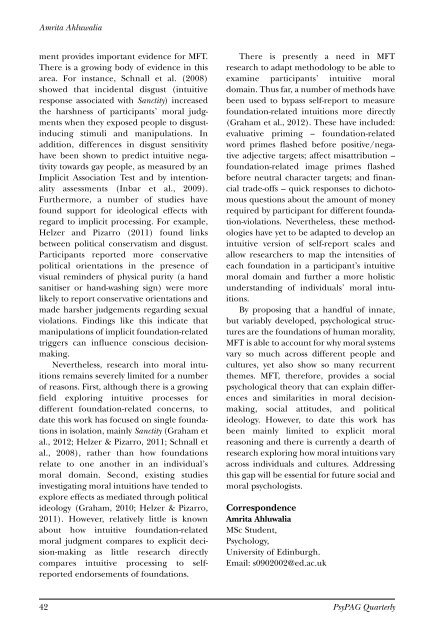Social Psychology Special Issue
XFCu7
XFCu7
Create successful ePaper yourself
Turn your PDF publications into a flip-book with our unique Google optimized e-Paper software.
Amrita Ahluwalia<br />
ment provides important evidence for MFT.<br />
There is a growing body of evidence in this<br />
area. For instance, Schnall et al. (2008)<br />
showed that incidental disgust (intuitive<br />
response associated with Sanctity) increased<br />
the harshness of participants’ moral judgments<br />
when they exposed people to disgustinducing<br />
stimuli and manipulations. In<br />
addition, differences in disgust sensitivity<br />
have been shown to predict intuitive negativity<br />
towards gay people, as measured by an<br />
Implicit Association Test and by intentionality<br />
assessments (Inbar et al., 2009).<br />
Furthermore, a number of studies have<br />
found support for ideological effects with<br />
regard to implicit processing. For example,<br />
Helzer and Pizarro (2011) found links<br />
between political conservatism and disgust.<br />
Participants reported more conservative<br />
political orientations in the presence of<br />
visual reminders of physical purity (a hand<br />
sanitiser or hand-washing sign) were more<br />
likely to report conservative orientations and<br />
made harsher judgements regarding sexual<br />
violations. Findings like this indicate that<br />
manipulations of implicit foundation-related<br />
triggers can influence conscious decisionmaking.<br />
Nevertheless, research into moral intuitions<br />
remains severely limited for a number<br />
of reasons. First, although there is a growing<br />
field exploring intuitive processes for<br />
different foundation-related concerns, to<br />
date this work has focused on single foundations<br />
in isolation, mainly Sanctity (Graham et<br />
al., 2012; Helzer & Pizarro, 2011; Schnall et<br />
al., 2008), rather than how foundations<br />
relate to one another in an individual’s<br />
moral domain. Second, existing studies<br />
investigating moral intuitions have tended to<br />
explore effects as mediated through political<br />
ideology (Graham, 2010; Helzer & Pizarro,<br />
2011). However, relatively little is known<br />
about how intuitive foundation-related<br />
moral judgment compares to explicit decision-making<br />
as little research directly<br />
compares intuitive processing to selfreported<br />
endorsements of foundations.<br />
There is presently a need in MFT<br />
research to adapt methodology to be able to<br />
examine participants’ intuitive moral<br />
domain. Thus far, a number of methods have<br />
been used to bypass self-report to measure<br />
foundation-related intuitions more directly<br />
(Graham et al., 2012). These have included:<br />
evaluative priming – foundation-related<br />
word primes flashed before positive/negative<br />
adjective targets; affect misattribution –<br />
foundation-related image primes flashed<br />
before neutral character targets; and financial<br />
trade-offs – quick responses to dichotomous<br />
questions about the amount of money<br />
required by participant for different foundation-violations.<br />
Nevertheless, these methodologies<br />
have yet to be adapted to develop an<br />
intuitive version of self-report scales and<br />
allow researchers to map the intensities of<br />
each foundation in a participant’s intuitive<br />
moral domain and further a more holistic<br />
understanding of individuals’ moral intuitions.<br />
By proposing that a handful of innate,<br />
but variably developed, psychological structures<br />
are the foundations of human morality,<br />
MFT is able to account for why moral systems<br />
vary so much across different people and<br />
cultures, yet also show so many recurrent<br />
themes. MFT, therefore, provides a social<br />
psychological theory that can explain differences<br />
and similarities in moral decisionmaking,<br />
social attitudes, and political<br />
ideology. However, to date this work has<br />
been mainly limited to explicit moral<br />
reasoning and there is currently a dearth of<br />
research exploring how moral intuitions vary<br />
across individuals and cultures. Addressing<br />
this gap will be essential for future social and<br />
moral psychologists.<br />
Correspondence<br />
Amrita Ahluwalia<br />
MSc Student,<br />
<strong>Psychology</strong>,<br />
University of Edinburgh.<br />
Email: s0902002@ed.ac.uk<br />
42 PsyPAG Quarterly



